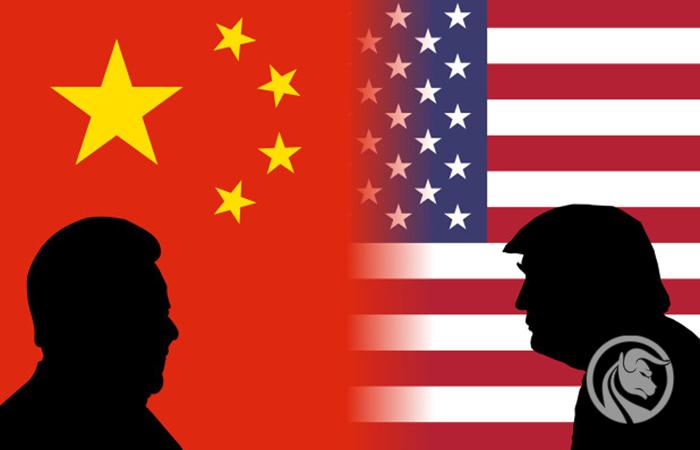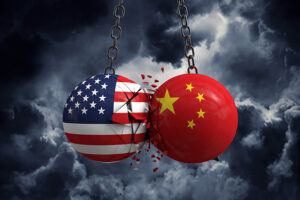How much will we lose in the US-China trade war?
Theoretically, negotiations on the trade agreement between the US and China are still ongoing. In practice, we have increased tariffs on Chinese goods announced by President Donald Trump, cutting off Chinese companies from technology and retaliatory actions on the part of the Middle Kingdom. Economists are already estimating the losses for the global economy and are calling it the next cold war. Where will it lead us?
We have heard a lot about the dispute between China and the US in recent weeks, but everything started to burn much earlier, when Huawei was in January 2019 accused by the US authorities of fraud, technology theft and unsuccessful attempts to steal the last 10 years. Other countries are following the Americans. In connection with the emerging accusations of affiliation with the services of the People's Republic of China, the cooperation offer with Huawei rejected, among others government of New Zealand and Australia. Japan is also considering the same step.
Be sure to read: The US budget deficit rose to 691 billion in Q1 2019
The US-China Cold War is 600 billion. dollars loss
However, the Huawei problem is just one of the threads of the trade war of the two largest economies in the world. We already know that the administration of Donald Trump has implemented new, higher rates of tariffs on Chinese products. They were raised from 10 percent. on 25 percent and they concern goods with a value of up to 200 billion. dollars. We also know that this was met with retaliation, for now on the sale of rare earth metals, which the Chinese are the world's largest producer. The authorities of the Middle Kingdom also raised tariffs on US commodities valued at around 60 billion. dollars. Only these two actions allowed the analysts to assess the losses that the global economy must prepare for.
Bloomberg Economics estimated that the two years in which the new rules were in force was a 0,3% drop in global GDP. A more negative scenario assumes a drop of 0,6%, which is possible if further restrictions are introduced. And these are getting closer, because Donald Trump has already announced that other groups of goods will be subject to higher tariffs - worth PLN 325 billion. That's 600 billion. dollars less traded worldwide. Moreover, it is estimated that we will not wait long for a slowdown - the first symptoms will appear at the end of the second quarter of this year.
Who benefits from the China-USA exchange?
Who carefully observed global trade in recent years, however, is not surprised by this turn of events. In trade between the US and China, for a long time there is no balance. The US deficit has already reached around 420 billion dollars in the 2018 year. It has grown significantly above all since the 2001 year, when Beijing could finally join the World Trade Organization. Thanks to this, Chinese goods flooded the US, but exports in the other direction did not accelerate at all. The Chinese authorities took care of this, because although there is no shortage of rich citizens who could afford to buy more expensive and higher-quality goods produced in the USA, the administration effectively hindered their purchase on a larger scale.
Especially that the Chinese do not even try to change the profile of their economy. They do not aspire to be innovative because they effectively copy the ideas of others. And thanks to lower labor costs, but also limited to a minimum of internal fiscalism, they effectively conquer the world with their goods.
US bonds - ace or jack up the sleeve?
On the other hand, the Chinese are looking at the dollar. This is visible from the lowest level of the economy. Virtually every retail outlet can be paid by US currency, and most sellers have a conversion rate and spend the rest in dollars or yuan. There are even those who prefer to take dollars from yuan! At the state level, it is similar. China has been buying US bonds for years, which are currently the most in the world. Their value is estimated at around 1, 2 trillion dollars.
There were rumors of willingness to sell them, but it would not hurt the US. The dollar still has high prices, so the willing ones probably would not be missing, and even if there were too few, it would be difficult to count on a discount, because it would prevent it buy back from the USA.
The Chinese may also try to weaken the US politically. However, it would be much more dangerous than the economic war, because support for the nuclear program of North Korea, or still restless Iran, could have a deplorable effect. The Chinese do not want to risk a military conflict, even far from their borders, because despite the huge investments in the army, the US would rather not have much chance.
Not everyone will lose
Although economists agree that the trade war is a measurable loss for the economy, then someone will probably fill the gap of cheap producers. Currently, the most people are pointing to Vietnam, which also competes with low prices, although it can not even compare with China at the moment. On the market of simple production, eg clothing or folding of batteries, he has already thrown gloves to the Chinese and has been dynamically developing production and sales. In the first quarter of this year, Vietnam exported goods worth over 13 billion to the USA.
- Vietnamese exports are taking over, and they are doing it quite quickly Says Thomas Costerg, an economist at Pictet Wealth Management. However, he points out that this does not necessarily mean a sudden boom in Vietnam. - We may be dealing with redirecting Chinese goods through Vietnam - he notes.






















![Forex Club – Tax 9 – Settle tax on a foreign broker [Download the Application] Forex Club - Tax 9](https://forexclub.pl/wp-content/uploads/2024/02/Forex-Club-Podatek-9-184x120.jpg?v=1709046278)
![Trading View platform – solutions tailored to the needs of traders [Review] trading view review](https://forexclub.pl/wp-content/uploads/2024/03/trading-view-recenzja-184x120.jpg?v=1709558918)
![How to connect your FP Markets account to the Trading View platform [Guide] fp markets trading view](https://forexclub.pl/wp-content/uploads/2024/02/fp-markets-trading-view-184x120.jpg?v=1708677291)
![How to invest in ChatGPT and AI? Stocks and ETFs [Guide] how to invest in chatgpt and artificial intelligence](https://forexclub.pl/wp-content/uploads/2023/02/jak-inwestowac-w-chatgpt-i-sztuczna-inteligencje-184x120.jpg?v=1676364263)


![Izabela Górecka – “Success on the market depends not only on knowledge, but also on emotional stability” [Interview] Izabela Górecka - interview](https://forexclub.pl/wp-content/uploads/2024/04/Izabela-Gorecka-wywiad-184x120.jpg?v=1713870578)
![WeWork – the anatomy of the collapse of a company valued at $47 billion [WeWork, part II] wework bankruptcy story](https://forexclub.pl/wp-content/uploads/2024/04/wework-bankructwo-historia-184x120.jpg?v=1711729561)
![Adam Neumann – the man who screwed up Softbank [WeWork, part AND] adam neumann wework](https://forexclub.pl/wp-content/uploads/2024/04/adam-neumann-wework-184x120.jpg?v=1711728724)





![How to transfer shares to another brokerage office [Procedure description] how to transfer shares to another brokerage house](https://forexclub.pl/wp-content/uploads/2024/03/jak-przeniesc-akcje-do-innego-biura-maklerskiego-184x120.jpg?v=1709556924)
![The most common mistakes of a beginner trader - Mr Yogi [VIDEO] Scalping - The most common mistakes of a beginner trader - VIDEO](https://forexclub.pl/wp-content/uploads/2024/03/Scalping-Najczestsze-bledy-poczatkujacego-tradera-VIDEO-184x120.jpg?v=1711601376)
![Learning patience: No position is also a position - Mr Yogi [VIDEO] Scalping - Learning patience - No position is also a position - VIDEO](https://forexclub.pl/wp-content/uploads/2024/03/Scalping-Nauka-cierpliwosci-Brak-pozycji-to-tez-pozycja-VIDEO-184x120.jpg?v=1710999249)
![When to exit a position and how to minimize losses - Mr Yogi [VIDEO] Scalping - When to exit a position and how to minimize losses - VIDEO](https://forexclub.pl/wp-content/uploads/2024/03/Scalping-Kiedy-wyjsc-z-pozycji-i-jak-minimalizowac-straty-VIDEO-184x120.jpg?v=1710336731)


















